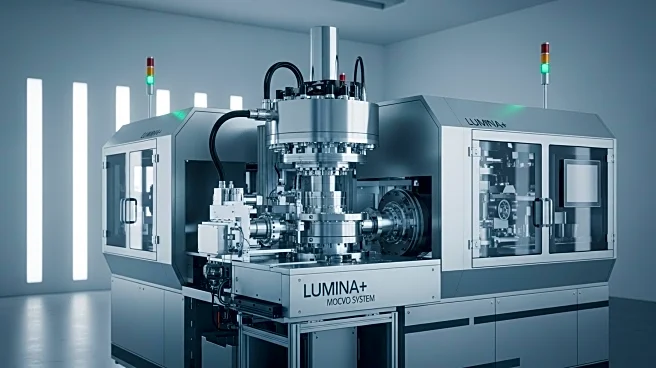What's Happening?
Veeco Instruments Inc. has announced the launch of its new Lumina+ metal-organic chemical vapor deposition (MOCVD) system, alongside securing a significant multi-tool order from Rocket Lab Corporation. This order is part of Rocket Lab's initiative under the Department of Commerce’s CHIPS and Science Act to enhance domestic production of compound semiconductor products. The Lumina+ system is designed to offer cost-effective scaling for next-generation applications, combining Veeco's TurboDisc technology with enhanced efficiency. This development marks a milestone for Veeco, reinforcing its leadership in the As/P field and expanding Rocket Lab's production capacity for space-grade solar cells and semiconductor technologies at its Albuquerque, New Mexico facility.
Why It's Important?
The launch of the Lumina+ system is significant for the U.S. semiconductor industry, particularly in the context of the CHIPS and Science Act, which aims to bolster domestic semiconductor manufacturing. By enhancing production capabilities, Veeco and Rocket Lab are contributing to reducing reliance on foreign semiconductor sources, which is crucial for national security and technological independence. The increased production capacity for space-grade solar cells and semiconductors will support various industries, including aerospace, consumer electronics, and biotechnology, potentially leading to advancements in these fields. This collaboration also highlights the importance of strategic partnerships in driving innovation and meeting the growing demand for advanced semiconductor technologies.
What's Next?
With the successful launch and order of the Lumina+ system, Veeco and Rocket Lab are poised to further strengthen their collaboration. The increased production capacity at Rocket Lab's facility is expected to meet the rising demand for domestically produced semiconductor technologies. This development may prompt other companies to invest in similar technologies, further boosting the U.S. semiconductor industry. Additionally, the ongoing support from the CHIPS and Science Act could lead to more initiatives aimed at enhancing domestic manufacturing capabilities, potentially influencing policy decisions and industry standards in the future.









